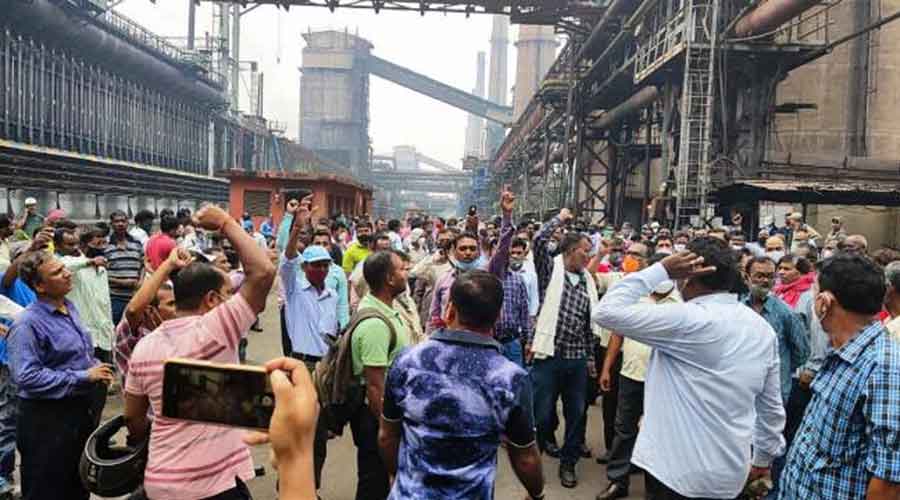The steel production was adversely affected in Bokaro Steel Plant on Wednesday as workers as well as infuriated employees staged a massive strike demanding pay revision.
The operations in almost all the mills and departments remained crippled for the entire day, as the employees abstained from performing work. At a few spots, including the most vital unit Blast Furnace, the workers also disrupted work for several hours.
This was the first time in the past two decades when a strike bore an impact. It has caused huge production and revenue loss worth several crores to the BSL management. Though the strike was observed in all the steel production units of Steel Authority of India Limited (SAIL), the BSL faced the worst.
The 12 trade unions including five of them affiliated to National Joint Committee for Steel (NJCS) staged a strike inside the plant to mount pressure on management for pay revision and other benefits of workers. Apart from Blast Furnace, the other zones including Cold Rolling Mill, Hot Strip Mill, Slabbing Mill, HRCF, coke oven saw very poor attendance of workers roughly between 0 to 5%.
BSL is a unit of Steel Authority of India Limited (SAIL). Chief of communication, BSL, Manikant Dhan said, “Strike called by various trade unions adversely affected the functioning of the plant. Attendance of employees in the A, B and General Shifts remained low. However, management took necessary steps for ensuring process safety and executives were deployed for operation of thermally sensitive equipment in the plant”.
To control the situation, BSL management had sought help from district administration, following which sub-divisional officer (SDO), Chas, Shashi Prakash Singh reached the blast furnace and removed the agitators blocking the railway track used for transporting ladels in which hot metals were supplied to other mills.
CISF personnel were engaged in controlling the agitators. The SDO said “Despite prohibitory orders against gathering issued by administration due to Covid-19, the BSL workers staged demonstrations and strikes. After being informed by the executive director (ED), we reached Blast Furnace and removed the agitators.”
BSL is a 4.5 MPTA capacity steel plant with 10,781 workforce. Of them, 1,806 are executives and 8,975 are non-executives. Though the strike call was given by trade unions, but this time employees are so infuriated against the management over delay in pay revision that they wilfully abstained from work. The decision on wage revision was pending from January, 1, 2017, said sources. This is the second strike faced by BSL in the past three months. Earlier in April, 13 Krantikari Ispat Majoor Sangh led by Sangram Singh had called strike and halted production for a few hours demanding pay revision.
Trade union leaders said, “All major departments inside the BSL plant faced shutdown with employees staged strike. We have demanded wage revision from the management by providing 15 percent minimum guarantee benefit, 35 percent perks, 9 percent pension and clearing the due arrears. The pay revision has been pending for the past five years”.
They added, “The wages of the contract labourers will have to be increased. The ceiling on gratuity is not acceptable. The dependents of the workers who died due to corona will have to be given jobs. All chargesheet suspensions will have to be withdrawn unconditionally.”
Plant sources said that the workers not only abstained from work, but also disrupted production at many departments by stopping other employees from working. BSL management virtually failed to pacify the situation. It is said that the Industrial relation department and Personnel department failed to assess the intensity of the strike after the call given by trade unions. The assessment of production and monetary loss is being ascertained by the BSL management.











